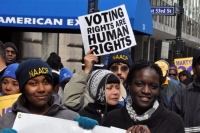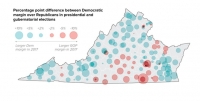Though cited to bring 4,500 jobs, the Dakota Access Pipeline seriously threatens tribal sovereignty, sacred burial grounds, and the water supply of the Standing Rock Sioux and potentially 17 million others. As organizations dedicated to elevating the struggles of our respective constituencies, we stand together to support our Native American kinfolk – one of the most marginalized and disenfranchised groups in our nation’s history – in their fight to protect their communities from further displacement and exploitation.
We recognize this systematic oppression that so intimately resonates with many communities of color and marginalized populations, whether it be fighting for lead-free water in Flint to uncontaminated water in North Dakota.
We remain committed to fighting the corporate interests that back this project and name this pipeline “a pipeline of corporate greed.” We challenge the labor movement to strategize on how to better engage and include Native people and other marginalized populations into the labor movement as a whole.
Lastly, we applaud the many labor unions working to create a new economy with good green jobs and more sustainable employment opportunities for all. We also encourage key stakeholders — labor unions including the building trades, the Standing Rock Sioux tribe and others who would be impacted — to come together to discuss a collective resolution.
As we just recently recognized Native American Women’s Equal Pay Day and as we approach November – a time that marks not only a significant change in our country’s leadership but also the celebration of Native American Heritage Month – we will continue to campaign and organize for a broader agenda that secures the rights for all working people in all communities.
About The Labor Coalition for Community Action (LCCA) - The AFL-CIO’s constituency groups – the A. Phillip Randolph Institute, Asian Pacific American Labor Alliance, Coalition of Black Trade Unionists, the Coalition of Labor Union Women, Labor Council for Latin American Advancement, and Pride at Work are unions’ bridges to diverse communities, creating and strengthening partnerships to enhance the standard of living for all workers. The groups also promote the full participation of women and minorities in the union movement and ensure unions hear and respond to the concerns of the communities they represent.


 Imagine going to the polls on Election Day and discovering that your ballot could be collected and reviewed by the
Imagine going to the polls on Election Day and discovering that your ballot could be collected and reviewed by the ACLU Blueprints Offer Vision to Cut US Incarceration Rate in Half by Prioritizing 'People Over Prisons'
ACLU Blueprints Offer Vision to Cut US Incarceration Rate in Half by Prioritizing 'People Over Prisons'  "These disasters drag into the light exactly who is already being thrown away," notes Naomi Klein
"These disasters drag into the light exactly who is already being thrown away," notes Naomi Klein  How about some good news? Kansas Democratic Representative advances bill for Native Peoples.
How about some good news? Kansas Democratic Representative advances bill for Native Peoples.  What mattered was that he showed up — that he put himself in front of the people whose opinions on
What mattered was that he showed up — that he put himself in front of the people whose opinions on On a night of Democratic victories, one of the most significant wins came in Virginia, where the party held onto
On a night of Democratic victories, one of the most significant wins came in Virginia, where the party held onto A seismic political battle that could send shockwaves all the way to the White House was launched last week in
A seismic political battle that could send shockwaves all the way to the White House was launched last week in In an interview with Reuters conducted a month after he took office, Donald Trump asserted that the U.S. had “fallen
In an interview with Reuters conducted a month after he took office, Donald Trump asserted that the U.S. had “fallen Attorney General Jeff Sessions overturned the sweeping criminal charging policy of former attorney general Eric H. Holder Jr. and directed
Attorney General Jeff Sessions overturned the sweeping criminal charging policy of former attorney general Eric H. Holder Jr. and directed